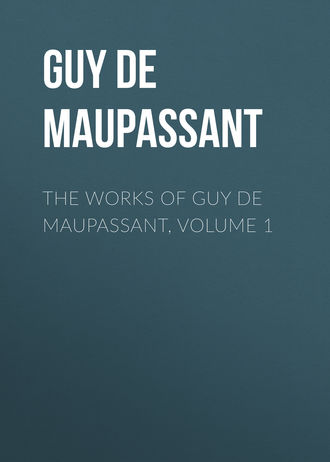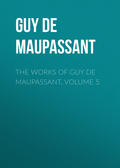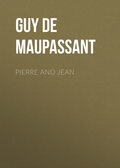
Ги де Мопассан
The Works of Guy de Maupassant, Volume 1
IN THE WOOD
The Mayor was just going to sit down to breakfast, when he was told that the rural policeman was waiting for him at the Mansion-house with two prisoners, and he went there immediately, and found old Hochedur standing up and watching a middle-class couple of mature years, with a severe look.
The man, a fat old fellow with a red nose and white hair, seemed utterly dejected; while the woman, a little roundabout, fat woman, with shining cheeks, looked at the agent of the authorities who had arrested them, with defiant eyes.
"What is it? What is it? Hochedur?"
The rural policeman made his deposition: He had gone out that morning at his usual time, in order to go on his beat from the forest of Champioux as far as the boundaries of Argenteuil. He had not noticed anything unusual in the country except that it was a fine day, and that the wheat was doing well, when the son of old Bredel, who was going over his vines a second time, called out to him: "Here, Daddy Hochedur, go and have a look into the skirts of the wood, in the first thicket, and you will catch a pair of pigeons there that must be a hundred and thirty years old between them!"
He went in the direction that had been indicated to him, and had gone into the thicket, and there he heard words and gasps, which made him suspect a flagrant breach of morality. Advancing, therefore, on his hands and knees, as if to surprise a poacher, he had arrested the couple who were there present, at the very moment when they were going to abandon themselves to their natural instincts.
The Mayor looked at the culprits in astonishment, for the man was certainly sixty, and the woman fifty-five at least, and so he began to question them, beginning with the man, who replied in such a weak voice that he could scarcely be heard.
"What is your name?" "Nicolas Beaurain." "Your occupation?" "Haberdasher, in the Rue des Martyrs, in Paris." "What were you doing in the wood?" The haberdasher remained silent, with his eyes on his fat stomach; and his hand resting on his thighs, and the Mayor continued: "Do you deny what the officer of the municipal authorities states?" "No, Monsieur." "So you confess it?" "Yes, Monsieur." "What have you to say in your defense?" "Nothing, Monsieur." "Where did you meet the partner in your misdemeanor?" "She is my wife, Monsieur." "Your wife?" "Yes, Monsieur." "Then … then … you do not live together … in Paris?" "I beg your pardon, Monsieur, but we are living together!" "But in that case … you must be mad, altogether mad, my dear sir, to get caught like that, in the country at ten o'clock in the morning."
The haberdasher seemed ready to cry with shame, and he murmured: "It was she who enticed me! I told her it was very stupid, but when a woman has got a thing into her head … you know … you cannot get it out of it."
The Mayor, who liked open speaking, smiled and replied: "In your case, the contrary ought to have happened. You would not be here, if she had had the idea only in her head!" Then Monsieur Beaurain was seized with rage, and turning to his wife, he said: "Do you see to what you have brought us with your poetry? And now we shall have to go before the Courts, at our age, for a breach of morals! And we shall have to shut up the shop, sell our good will and go to some other neighborhood! That's what it has come to!"
Madame Beaurain got up, and without looking at her husband, she explained herself without any embarrassment, without useless modesty, and almost without hesitation.
"Of course, Monsieur, I know that we have made ourselves ridiculous. Will you allow me to plead my cause like an advocate; or rather like a poor woman; and I hope that you will be kind enough to send us home, and to spare us the disgrace of a prosecution.
"Years ago, when I was young, I made Monsieur Beaurain's acquaintance on Sunday in this neighborhood. He was employed in a draper's shop, and I was a young lady in a ready made clothing establishment. I remember it, as if it were yesterday. I used to come and spend Sundays here occasionally with a friend of mine, Rose Levéque, with whom I lived in the Rue Pigalle, and Rose had a sweetheart, while I had not. He used to bring us here, and one Saturday, he told me, laughing, that he should bring a friend with him the next day. I quite understood what he meant, but I replied that it would be no good; for I was virtuous, Monsieur.
"The next day we met Monsieur Beaurain at the railway station, and in those days he was good-looking, but I had made up my mind not to yield to him, and I did not yield. Well, we arrived at Bezons. It was a lovely day, the sort of day that tickles your heart. When it is fine, even now, just as it used to be formerly, I grow quite foolish, and when I am in the country I utterly lose my head. The verdure, the swallows flying so swiftly, the smell of the grass, the scarlet poppies, the daisies, all that makes me quite excited! It is like champagne when one is not used to it!
"Well, it was lovely weather, warm and bright, and it seemed to penetrate into your body by your eyes when you looked, and by your mouth when you breathed. Rose and Simon hugged and kissed each other every minute, and that gave me something to look at! Monsieur Beaurain and I walked behind them, without speaking much, for when people do not know each other they do not find anything to talk about. He looked timid, and I liked to see his embarrassment. At last we got to the little wood; it was as cool as in a bath there, and we all four sat down. Rose and her lover joked me because I looked rather stern, but you will understand that could not be otherwise. And then they began to kiss and hug again, without putting any more restraint upon themselves than if we had not been there; and then they whispered together, and then got up and went off among the trees, without saying a word. You may fancy what I looked like, alone with this young fellow, whom I saw for the first time. I felt so confused at seeing them go that it gave me courage and I began to talk. I asked him what his business was, and he said he was a linen draper's assistant, as I told you just now. We talked for a few minutes and that made him bold, and he wanted to take liberties with me, but I told him sharply to keep his own place. Is not that true, Monsieur Beaurain?"
Monsieur Beaurain, who was looking at his feet in confusion, did not reply, and she continued: "Then he saw that I was virtuous, and he began to make love to me nicely, like an honorable man, and from that time he came every Sunday, for he was very much in love with me. I was very fond of him also, very fond of him! He was a good-looking fellow, formerly, and in short he married me the next September, and we started in business in the Rue des Martyrs.
"It was a hard struggle for some years, Monsieur. Business did not prosper, and we could not afford many country excursions, and then we had grown unaccustomed to them. One has other things in one's head, and thinks more of the cash box than of pretty speeches, when one is in business. We were growing old by degrees without perceiving it, like quiet people who do not think much about love. One does not regret anything as long as one does not notice what one has lost.
"And after that, Monsieur, business went better, and we became tranquil as to the future! Then, you see, I do not exactly know what passed within me, no, I really do not know, but I began to dream like a little boarding-school girl. The sight of the little carts full of flowers which are drawn about the streets, made me cry; the smell of violets sought me out in my easy-chair, behind my cash box, and made my heart beat! Then I used to get up and go onto the doorstep to look at the blue sky between the roofs. When one looks at the sky from a street, it looks like a river which descends on Paris, winding as it flows, and the swallows pass to and fro in it like fish. This sort of things is very stupid at my age! But what can one do, Monsieur? when one has worked all one's life? A moment comes in which one perceives that one could have done something else, and then, one regrets, oh! yes, one feels great regret! Just think that for twenty years I might have gone and had kisses in the woods, like other women. I used to think how delightful it would be to lie under the trees, loving some one! And I thought of it everyday and every night! I dreamt of the moonlight on the water, until I felt inclined to drown myself.
"I did not venture to speak to Monsieur Beaurain about this at first. I knew that he would make fun of me, and send me back to sell my needles and cotton! And then, to speak the truth, Monsieur Beaurain never said much to me, but when I looked in the glass, I also understood quite well, that I also no longer appealed to anyone!
"Well, I made up my mind, and I proposed an excursion into the country to him, to the place where we had first become acquainted. He agreed without any distrust, and we arrived here this morning, about nine o'clock.
"I felt quite young again when I got among the corn, for a woman's heart never grows old! And really, I no longer saw my husband as he is at present, but just like he was formerly! That I will swear to you, Monsieur. As true as I am standing here, I was intoxicated. I began to kiss him, and he was more surprised than if I had tried to murder him. He kept saying to me: 'Why, you must be mad! You are mad this morning! What is the matter with you?..' I did not listen to him, I only listened to my own heart, and I made him come into the woods with me… There it is… I have spoken the truth, Monsieur le Maire, the whole truth."
The Mayor was a sensible man. He rose from his chair, smiled, and said: "Go in peace, Madame, and sin no more … under the trees."
A FAMILY
I was going to see my friend Simon Radevin once more, whom I had not had a sight of for fifteen years. Formerly he used to be my most intimate friend, and I used to spend long, quiet and happy evenings with him; he was one of those men to whom one tells one's most intimate affairs of the heart, for whom one finds, when conversing tranquilly, rare, clever, ingenious and refined thoughts, which excite the mind and put it at its ease.
For years we had scarcely been separated; we had lived, traveled, thought and dreamt together; had liked the same things with the same liking, had admired the same books, comprehended the same works, shivered with the same sensations, and very often laughed at the same individuals, whom we understood completely, by merely exchanging a glance.
Then he married; quite unexpectedly he married a little girl from the provinces, who had come to Paris in search of a husband. How ever could that little, thin, insipidly fair girl, with her weak hands, her light, vacant eyes, and her clear silly voice, who was exactly like a hundred thousand marriageable dolls, have picked up that intelligent, clever young fellow? Can anyone understand these things? No doubt he had hoped for happiness, simple, quiet and long-enduring happiness, in the arms of a good, tender and faithful woman; he had seen all that in the transparent looks of that school girl with light hair.
He had not dreamt of the fact that an active, living and vibrating man grows tired as soon as he has comprehended the stupid reality, unless indeed, he becomes so brutalized that he understands nothing more whatever.
What would he be like when I met him again? Still lively, witty, light hearted and enthusiastic, or in a state of mental torpor through provincial life? A man can change a great deal in the course of fifteen years!
The train stopped at a small station, and as I got out of the carriage, a stout, a very stout man with red cheeks and a big stomach rushed up to me with open arms, exclaiming: "George!" I embraced him, but I had not recognized him, and then I said, in astonishment: "By Jove! You have not grown thin!" And he replied with a laugh: "What did you expect? Good living, a good table and good nights! Eating and sleeping, that is my existence!"
I looked at him closely, trying to find the features I held so dear in that broad face. His eyes alone had not altered, but I no longer saw the same looks in them, and I said to myself: "If the looks be the reflection of the mind, the thoughts in that head are not what they used to be formerly; those thoughts which I knew so well."
Yet his eyes were bright, full of pleasure and friendship, but they had not that clear, intelligent expression, which expresses as much as words do, the value of the mind. Suddenly he said to me: "Here are my two eldest children." A girl of fourteen, who was almost a woman, and a boy of thirteen, in the dress of a boy from a Lycée, came forward in a hesitating and awkward manner, and I said in a low voice: "Are they yours?" "Of course they are," he replied laughing. "How many have you?" "Five! There are three more indoors."
He said that in a proud, self-satisfied, almost triumphant manner, and I felt profound pity, mingled with a feeling of vague contempt for this vainglorious and simple reproducer of his species, who spent his nights in his country house in making children.
I got into a carriage, which he drove himself, and we set off through the town, a dull, sleepy, gloomy town, where nothing was moving in the streets except a few dogs and two or three maidservants. Here and there a shopkeeper standing at his door took off his hat, and Simon returned his salute and told me the man's name; no doubt to show me that he knew all the inhabitants personally, and the thought struck me that he was thinking of becoming a candidate for the Chamber of Deputies, that dream of all who have buried themselves in the provinces.
We were soon out of the town, and the carriage turned into a garden, which had some pretensions to being a park, and stopped in front of a turretted house, which tried to pass for a château.
"That is my den," Simon said, so that he might be complimented on it, and I replied that it was delightful.
A lady appeared on the steps, dressed up for a visitor, her hair done for a visitor, and with phrases ready prepared for a visitor. She was no longer the light haired, insipid girl I had seen in church fifteen years previously, but a stout lady in curls and flounces, one of those ladies without any fixed age, without intellect, without any of those things which constitute a woman. In short, she was a mother, a stout, commonplace mother, the human layer and brood mare, that machine of flesh which procreates without any other mental preoccupation, except her children and her housekeeping book.
She welcomed me, and I went into the hall, where three children, ranged according to their height, seemed set out for review, like firemen before a mayor, and I said: "Ah! ah! so these are the others?" And Simon, who was radiant with pleasure, named them: "Jean, Sophie and Gontran."
The door of the drawing-room was open. I went in and in the depths of an easy-chair I saw something trembling, a man, an old, paralyzed man. Madame Radevin came forward and said: "This is my grandfather, Monsieur; he is eighty-seven." And then she shouted into the shaking old man's ears: "This is a friend of Simon's, papa." The old gentleman tried to say "good day" to me, and he muttered: "Oua, oua, oua," and waved his hand, and I took a seat, saying: "You are very kind, Monsieur."
Simon had just come in, and he said with a laugh: "So! You have made grandpapa's acquaintance. He is priceless, is that old man; he is the delight of the children, and he is so greedy that he almost kills himself at every meal; you have no idea what he would eat if he were allowed to do as he pleased. But you will see, you will see. He likes all the sweets as if they were so many girls. You have never seen anything funnier; you will see it presently."
I was then shown to my room to change my dress for dinner, and hearing a great clatter behind me on the stairs, I turned round and saw that all the children were following me behind their father; to do me honor, no doubt.
My windows looked out onto a plain, bare, interminable plain, an ocean of grass, of wheat, and of oats, without a clump of trees or any rising ground, a striking and melancholy picture of the life which they must be leading in that house.
A bell rang; it was for dinner, and so I went downstairs. Madame Radevin took my arm in a ceremonious manner, and we went into the dining-room. A footman wheeled in the old man's armchair, who gave a greedy and curious look at the dessert, as he with difficulty turned his shaking head from one dish to the other.
Simon rubbed his hands: "You will be amused," he said; and all the children understood that I was going to be indulged with the sight of their greedy grandfather, and they began to laugh accordingly, while their mother merely smiled and shrugged her shoulders, and Simon, making a speaking trumpet of his hands, shouted at the old man: "This evening there is sweet rice cream," and the wrinkled face of the grandfather brightened, and he trembled more violently all over, showing that he had understood and was very pleased. The dinner began.
"Just look!" Simon whispered. The grandfather did not like the soup, and he refused to eat it; but he was made to, on account of his health, and the footman forced the spoon into his mouth, while the old man blew energetically, so as not to swallow the soup, which was thus scattered like a stream of water onto the table and over his neighbors. The children shook with delight at the spectacle, while their father, who was also amused, said: "Is not the old man funny?"
During the whole meal, they were all taken up solely with him. He devoured the dishes which were put on the table, with his eyes, and he tried to seize them and pull them to himself with his trembling hands. They put them almost within his reach, to see his useless efforts, his trembling clutches at them, the piteous appeal of his whole nature, of his eyes, of his mouth and of his nose as he smelt them, and he slobbered onto his table napkin with eagerness, while uttering inarticulate grunts. And the whole family was highly amused at this horrible and grotesque scene.
Then they put a tiny morsel onto his plate, which he ate with feverish gluttony, in order to get something more as soon as possible, and when the rice-cream was brought in, he nearly had a fit, and groaned with greediness, and Gontran called out to him: "You have eaten too much already; you will have no more." And they pretended not to give him any. Then he began to cry; he cried and trembled more violently than ever, while all the children laughed. At last, however, they gave him his helping, a very small piece; and as he ate the first mouthful of the pudding, he made a comical and greedy noise in his throat, and a movement with his neck like ducks do when they swallow too large a morsel, and then, when he had done, he began to stamp his feet, so as to get more.
I was seized with pity for this saddening and ridiculous Tantalus, and I interposed on his behalf: "Please, will you not give him a little more rice?" But Simon replied: "Oh! no, my dear fellow, if he were to eat too much, it might harm him, at his age."
I held my tongue, and thought over these words. Oh! ethics! Oh! logic! Oh! wisdom! At his age! So they deprived him of his only remaining pleasure out of regard for his health! His health! What would he do with it, inert and trembling wreck that he was? They were taking care of his life, so they said. His life? How many days? Ten, twenty, fifty, or a hundred? Why? For his own sake? Or to preserve for some time longer the spectacle of his impotent greediness in the family.
There was nothing left for him to do in this life, nothing whatever. He had one single wish left, one sole pleasure; why not grant him that last solace constantly, until he died?
After playing cards for a long time, I went up to my room and to bed; I was low-spirited and sad, sad, sad! I sat at my window, but I heard nothing but the beautiful warbling of a bird in a tree, somewhere in the distance. No doubt the bird was singing thus in a low voice during the night, and to lull his mate, who was sleeping on her eggs.
And I thought of my poor friend's five children, and pictured him to myself, snoring by the side of his ugly wife.






